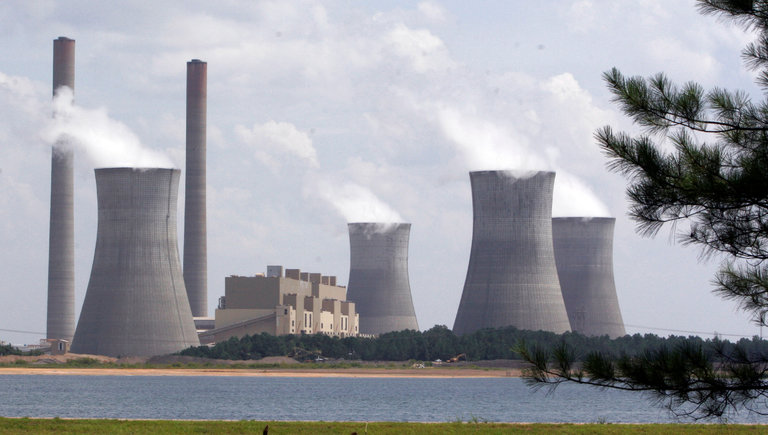
A coal-fired power plant in Juliette, Ga., in 2007. Roughly half of Americans say steps like restricting power plant emissions and improving vehicle fuel efficiency could make a big difference in combating climate change, a Pew Research Center poll found. CreditGene Blythe/Associated Press
Just over a third of Americans say they care a great deal about climate change. Among them, 72 percent are Democrats and 24 percent are Republicans; both numbers include independents who say they generally lean toward one party.
On other questions on climate change, Americans remain starkly divided: Nearly seven of 10 Democrats believe climate change is mainly a result of human activity; fewer than a quarter of Republicans believe that. A similarly worded question that appeared on surveys from 2006 to 2015 found comparable gaps on the perceived causes of climate change.
According to some scientists who study public perceptions of climate change, the United States is unusual in its relatively low level of public interest and engagement. In a poll conducted last year, around the time that world leaders gathered in Paris to negotiate a climate agreement, Pew found that among the 40 countries surveyed, a median of 54 percent of peopleconsidered climate change a serious problem. Among Americans, the figure was 45 percent, that poll found.
The new survey did find areas in which Americans agree across party lines. More than 80 percent, including wide majorities of Democrats, Republicans and independents, favor expansion of the solar and wind industries. About two-thirds of Americans say that climate scientists should play a major role in policy decisions related to climate change.
When it comes to solutions, roughly half of all Americans say that restricting power plant emissions, improving vehicle fuel efficiency and adhering to an international agreement to limit carbon emissions could make a big difference. Republicans are generally more skeptical of the power of individual actions to mitigate climate change.
The Pew poll was conducted as part of a study of science and society. Many of the questions focused on public attitudes toward scientists as a group, and climate scientists in particular. Scientists over all — especially those in medicine — are widely trusted by Americans, with more than three-quarters of people saying they trust them a great deal or a fair amount.
However, climate scientists do not command the same level of public faith. Only 22 percent of Republicans said they trusted climate scientists to give “full and accurate” information on the causes of climate change; for Democrats, that number was 54 percent.
More than 90 percent of climate scientists agree that human activity causes climate change, according to several studies published over the last few years. This level of scientific consensus does not appear to have registered with the public. Just under 40 percent of Democrats perceive widespread consensus; among Republicans, it is just 15 percent.
More than half of conservative Republicans think that scientists’ findings are influenced most of the time by their own career interests or political leanings.
Though scientific knowledge is roughly the same among people in both parties, the poll found, that knowledge is no indication of whether Republicans think the earth is warming because of human activity. Among Republicans with high science knowledge (determined by the number of correct responses they gave to science-related questions), 23 percent said human activity was causing climate change. Among Democrats, the level of science knowledge was a better indicator of belief in human effect on the climate.
“It could be the case that people’s political orientations are an anchoring point for applying their knowledge — rather than the other way around,” the Pew report said.
Bob Inglis, a former Republican congressman from South Carolina who is working to get members of his party to accept climate change, said the language often used to discuss the issue had, in part, created the gap in the perceptions of liberals and conservatives.
Part of it is that climate change has been framed as a question of belief, he said. He said that climate activists’ insistence on individual sacrifice drives conservatives crazy.
“When you say you’re shivering or sweating in the dark to save the planet, conservatives don’t cotton to it,” Mr. Inglis said.
More effective, he said, would be to argue that addressing climate change would result in “greater independence, more mobility and more freedom.”
The survey was conducted May 10 to June 6 among 1,534 American adults, with online and mail responses as part of the American Trends Panel created by Pew Research.

 Previous page
Previous page Back to top
Back to top







